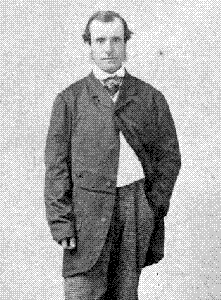Robert Burnaby
Robert Burnaby | |
|---|---|
 | |
| Member of the Legislative Assembly of Vancouver Island | |
| In office July 27, 1860 – November 28, 1865 | |
| Preceded by | James Cooper |
| Succeeded by | John Ash |
| Constituency | Esquimalt County (1860–1863) Esquimalt and Metchosin (1863–1865) |
| Personal details | |
| Born | November 30, 1828 Woodthorpe, Leicestershire |
| Died | January 10, 1878 (aged 49) Woodthorpe, Leicestershire |
| Children | 1 |
| Parent(s) | Reverend Thomas Burnaby; Sarah Meares |
| Occupation | Private Secretary to Richard Clement Moody; Freemasonic officer; Member of the Legislative Assembly of Vancouver Island |
Robert Burnaby (November 30, 1828 – January 10, 1878) was an English politician and civil servant in British Columbia, where he served as Private Secretary to Richard Clement Moody, who was the founder and the first Lieutenant-Governor of British Columbia. Moody named Burnaby Lake, in British Columbia, after Burnaby, and the city of Burnaby was subsequently named after Burnaby, as were at least ten other geographical features, including a mountain, Robert Burnaby Park, a Haida Gwaii Island, and a street in Vancouver.
Private Secretary to Richard Clement Moody and Legislative Assembly of Vancouver
[edit]Burnaby was born in Woodthorpe, Leicestershire. He initially worked for the British Civil Service in London. On the strength of a recommendation by Sir Edward Bulwer-Lytton, Richard Clement Moody hired Burnaby as his Personal Secretary, as which Burnaby contributed to the settlement of the towns of Queensborough, Hope and Yale, and explored the area around Burnaby Lake, which Moody named after him. However, Burnaby shortly founded a commission-trading business with his friend Edward Henderson, in Victoria, to speculate in a coal mine in Burrard Inlet, that folded in 1865, after which he worked in real estate and insurance. Burnaby during 1862 claimed that he had a prior claim, to that of the "Three Greenhorn Englishmen", to what is now the West End, Vancouver, but Judge Chartres Brew dismissed his documents as forgeries that were "obviously written by a liar or a knave".[1]
Burnaby ran for the Legislative Assembly and was elected as its member from Esquimalt and Metchosin, as which he served for five years. Burnaby contributed to the foundation of the Victoria Chamber of Commerce, and was President of the Amateur Dramatic Association of Victoria. He was a friend of the Judges Matthew Baillie Begbie and Henry Pering Pellew Crease, and of Gold-Commissioner Thomas Elwyn.
Freemasonry
[edit]Burnaby contributed to the development of Freemasonry in British Columbia. In 1860, Burnaby helped to found Victoria Lodge No. 1085, which was the first lodge in British Columbia, and was elected its first Past Master.[2] He was the first District Grand Master of District Grand Lodge for British Columbia when it was formed in 1868, under the Grand Lodge of England. Burnaby initially opposed a plan by the Scottish Grand Lodge to form their Grand Lodge in British Columbia, until he tabled the motion to create the new Grand Lodge of British Columbia on October 21 1871. Burnaby refused the post of its Grand Master as a consequence of his poor health, but was elected first Past Grand Master.[3] He retired in 1869, and returned to England in 1874, and died in 1878.
Settlements named after Burnaby
[edit]When the area around Burnaby Lake, which Richard Clement Moody had named after Burnaby, was incorporated, in 1892, the new municipality named it Burnaby. An island and a narrows in Haida Gwaii, a street in Vancouver's West End, a hill, and a Park in Burnaby itself, are named after him. At least eleven geographical features in British Columbia bear his name.[1]
References
[edit]- History of Burnaby online pdf view from the Heritage Burnaby website
- Robie L. Reid, Historical Notes and Biographical Sketches 1848 - 1935 "Bio of Robert Burnaby" at Grand Lodge BC & Yukon website
- Madge Wolfenden, "Robert Burnaby" at Dictionary of Canadian Biography online, 2000
- Tom Snyders with Jennifer O'Rourke, Namely Vancouver: A Hidden History of Vancouver Place Names (Vancouver: Arsenal Pulp Press, 2001)
